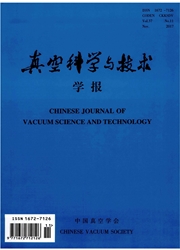

 中文摘要:
中文摘要:
采用射频分子束外延方法生长了氮化铝薄膜材料,研究了生长条件对外延层中位错和点缺陷等晶体缺陷的影响。结果表明,在富Al条件下,适当提高生长温度有利于抑制位错的产生,但同时会引入更多的氧杂质点缺陷。而对于空位点缺陷,在富Al条件下进行二维生长可同时增强Al和N原子的迁移,因此可有效地减少Al空位和N空位。但是,相比于Al空位,薄膜中的N空位更难以消除。
 英文摘要:
英文摘要:
The AlN films were grown by radio frequency molecular beam epitaxy on sapphire substrate.The influence of the deposition conditions,such as the contents of Al and N,substrate temperature,and deposition rate,on the formation of defects,including dislocations,point defects in the epi-layers,was evaluated.The results show that the Al content and substrate temperature strongly affects the defect formation.For instance,under Al rich growth condition,a small increase of the substrate temperature resulted in lower dislocation density,accompanied by higher density of oxygen point defects.We found that the two dimension growth mode under Al rich growth condition considerably reduced the Al-vacancy and N-vacancy,possibly because of enhanced surface migration of both Al and N atoms.However,elimination of the N-vacancy was found to be more difficult than removal of the Al-vacancy.
 同期刊论文项目
同期刊论文项目
 同项目期刊论文
同项目期刊论文
 Improving the internalquantum efficiency of green InGaN quantum dots through coupled InGaN/GaNquantu
Improving the internalquantum efficiency of green InGaN quantum dots through coupled InGaN/GaNquantu InGaN quantum dot green light-emitting diodes with negligible blue shift of electroluminescence peak
InGaN quantum dot green light-emitting diodes with negligible blue shift of electroluminescence peak 期刊信息
期刊信息
